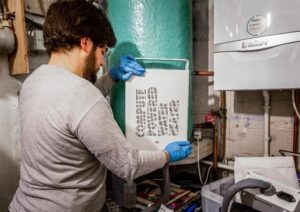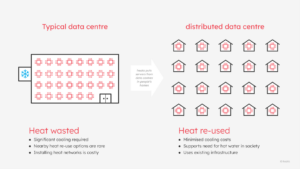heata

heata is a young innovative company, based in Surrey, UK, who is harnessing the heat from cloud computing to heat water in homes, reducing businesses’ carbon footprint and saving households money. The company is pioneering a new business model, moving processing out of data centres into domestic properties and using the waste heat generated by the computer to heat water in the homes.
heata was founded in 2017 by Chris Jordan (CTO) and Michael Paisley (Head of Design). A friend was running a programme to bring start-up-like innovation to British Gas, supporting the elderly and people in fuel poverty was one of the areas of focus.
Heat is often generated by making it hard for electrons to pass through something Chris had often thought, couldn’t those electrons be doing something useful at the same time? Bitcoin mining and the vast quantities of energy and waste heat the miners were using and generating was very topical. He thought that perhaps they could bring these two things together to help.
The team put a ‘miner’ (a networked computer that processes transactions in exchange for a payment in Bitcoin) in a barrel of mineral oil and connected it up to a radiator to demonstrate the idea. It took a little while to get through security, but once it was set-up the British Gas team could see that the miner was making money and they could feel the free heat it was generating – the radiator was hot! British Gas then funded another stage of work to explore the idea further.
However, radiators are only used for half of the year, which would mean wasting heat for half the year or having a seasonal business. So they re-engineered the system to work with domestic hot water cylinders where demand is fairly constant all year round. They also switched from Bitcoin mining to general computing, so it could support the decarbonisation of a rapidly growing industry. The clever bit, the thermal transfer mechanism to transfer the heat from the server into the water in the cylinder, has been patented. The energy used for heata’s processing is used twice – once for compute, and then again for hot water. The electricity is paid for by heata, so the households benefit from free hot water.

The next step was to test the network which they have done as part of an Innovate UK funded trial to gain recognition for the heata unit as an energy efficiency measure in UK homes. Through this process they have gained greater insights and data on the impact of the heata unit within people’s homes and worked through the process of identifying and selecting suitable homes. They are also working on a pilot with Civo – a cloud service provider, to see how the heata network could support a more sustainable option within their platform.
Workloads-wise the heata network processes intensive offline batch compute workloads, not real time services like hosting and serving websites and apps. Areas that require this sort of processing include medical research, engineering, climate research, computational finance and risk analysis, and less time sensitive tasks where a significant amount of data needs to be processed on a regular schedule.
Some workloads are more resource-hungry than others, with the more resource-hungry ones a good fit for heata as they generate more heat! 3D rendering is a great example, where each frame in an animation might take a number of hours to render. Multiply that by 24 frames a second, then by minutes and in the case of films many minutes, and it very quickly adds up. It’s integral to so many industries; from architecture and product design, to tv, film and gaming, enabling the creation of stunning, immersive visual experiences that form a part of so much of the media we consume. Yet its carbon impact is pretty much invisible. An animated tv show could be generating 1000s of days of free hot water for households and avoiding 100s of tonnes of carbon if the heat was re-used and the cooling energy requirements were avoided.
It’s great to see a young organisation not just developing technology but also looking at business process re-engineering to see how we can combat some of the challenges we have in society today, including:
– Fuel poverty;
– Growth of AI creating an increased demand for data centre capacity;
– Smarter use of resources by data centres
– How to better understand and reduce scope emissions;
It does beg the question – do data centres need to be re-engineered as a resilient sustainable facility? Should they be more closely linked with communities, who can make use of the excess heat generated?

OpenUK and the Open Compute Project are building a data centre ‘blueprint’ which aims to provide a framework for more sustainable decision making across all aspects of data centre infrastructure, from the design of the hardware within, to the physical infrastructure and buildings that they require – is it better to re-use suitable buildings rather than build a new data centre, with the associated huge embodied carbon costs?
heata have just been successful in attracting a £1 million seed funding round which will be used to further develop the low carbon cloud compute network (September 2023). The round was led by Mark Boost of Civo, with remaining contributions from Green Angel Ventures and other angel investors. British Gas retains its stake in the business.
heata are looking for other partners to work with, both commercial and non-commercial, so please get in touch with them to find out more. You can find out more about heata and their latest progress on their website or by emailing Chris or Mike at hello@heata.co.
We wish heata every success with the continuing development and future fundraising. We’ll certainly be keeping an eye on their progress.
Images courtesy of heata